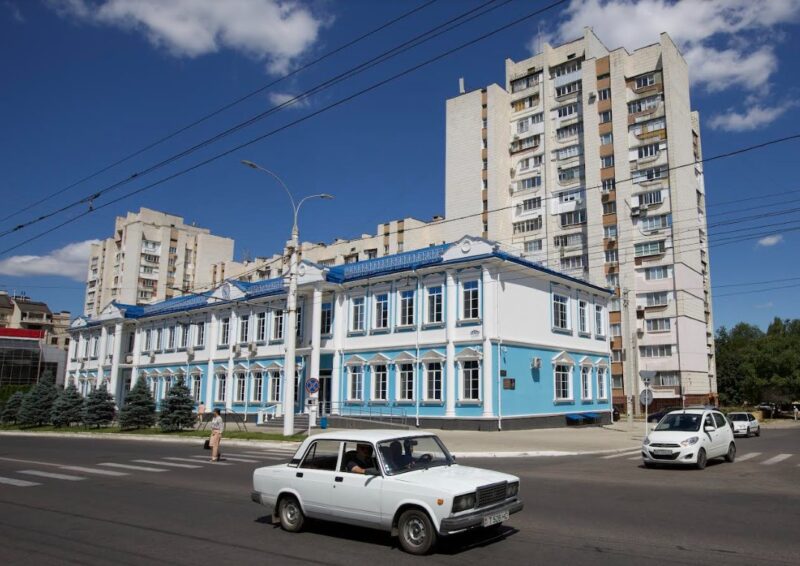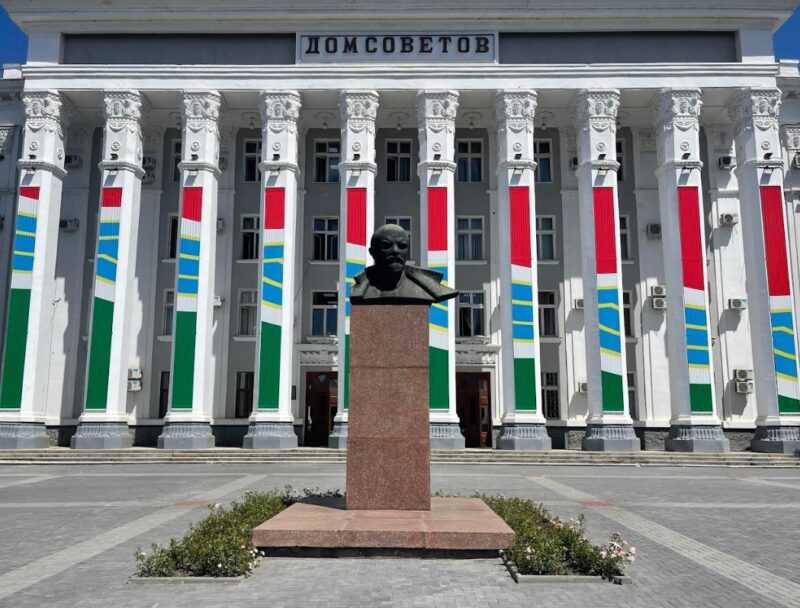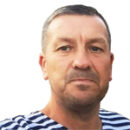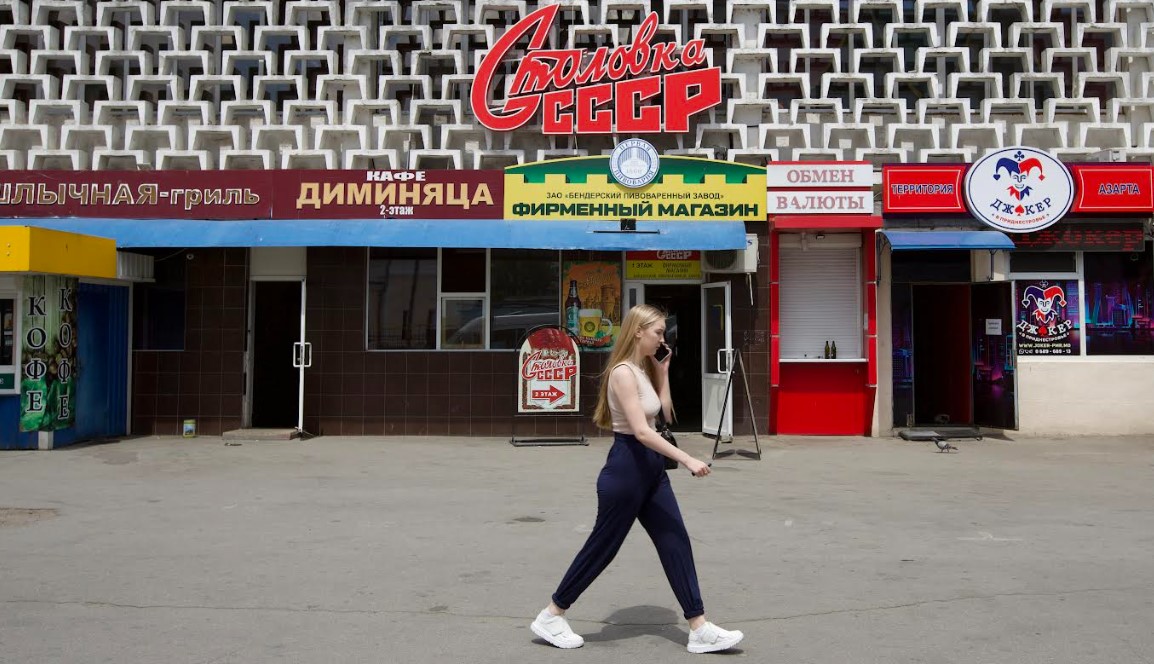 A teenage girl walks past modern shops built into an original Soviet building in the city of Bender. Photo credit: Dean O'Brien
A teenage girl walks past modern shops built into an original Soviet building in the city of Bender. Photo credit: Dean O'Brien
War or peace? The future of Transnistria
The war is getting closer to Transnistria every day, but the region – a self-proclaimed republic with Russian backing – is still calm and life goes on as usual. However, several threats are on the horizon. Is Transnistria the first country to which war will spill over? We visited this almost forgotten part of Eastern Europe where the Soviet heritage is still visible and present.
Published: September 7, 2022, 9:48 am
As the conflict continues in Ukraine, more recently eyes have been looking towards a small strip of land located between the east bank of the Dniester River and Moldova’s border with Ukraine. There lies the Pridnestrovian Moldavian Republic (PMR), better known in the West as “Transnistria”.
Internationally it’s recognised as part of Moldova but has been independent since 1992 with backing from Russia. Near the monument of Alexander Suvorov in the centre of Tiraspol fly the flags of the three countries that officially recognise the PMR; Abkhazia, Artsakh and South Ossetia – all of them also break-away republics without international recognition.
Although this is a self-proclaimed republic, it operates and functions just like any other country. It has its own army, police, fire service and currency. Transnistria has its own central bank, which issues the Transnistrian Ruble (PRB). It is also the only country in the world to use the Transnistrian Ruble coin, which is made of a plastic composite material.
Russia provides the region with free natural gas and at present there are around 1 500 Russian soldiers based here who act as peace-keepers.
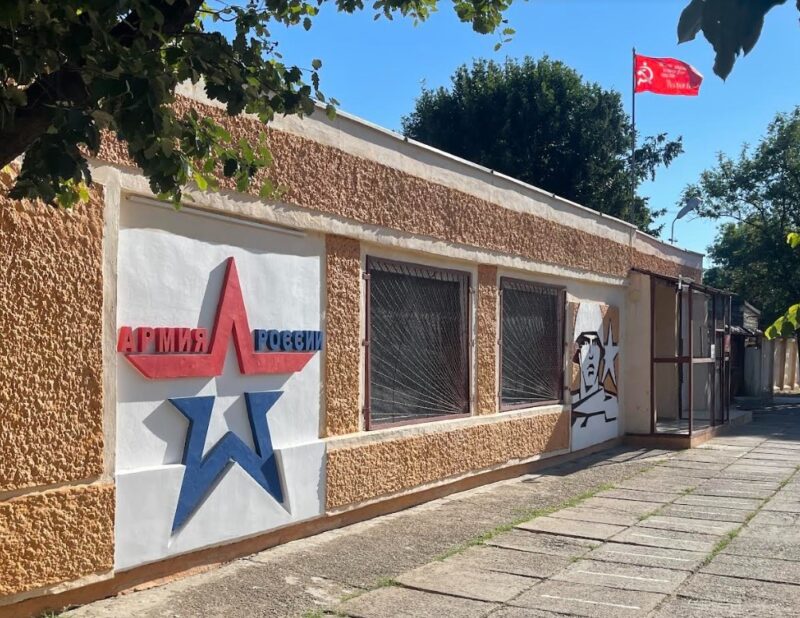
A Russian army base in the city of Tiraspol where many Russian soldiers are based. Photo credit: Dean O’Brien
With its population of around 475 000, over 30 percent here in Transnistria speak Russian and as I wander the streets, unlike Ukraine, Lenin monuments still stand along with other Soviet monuments. The St. George’s ribbon is displayed on vehicles and virtually everyone that I met speaks Russian. Schools along with many other buildings still have Soviet mosaics proudly displayed on their establishments.
Bars and cafes stay open late into the night, and as children play in fountains near the main square there is a sense of calm here. Soviet taxis are parked on the road against a backdrop of both ultra-modern buildings and traditional Soviet apartment blocks. Because the region benefits from free Russian natural gas, life is good compared to nearby Moldova, which is the poorest country in Europe.
The 90’s war
In 1990 the region declared its independence, as did many other former Soviet republics and regions, but this declaration of freedom was met with dismay from Chisinau, the capital of Moldova. The situation deteriorated into an armed conflict with Moldova in 1992. Although the war only lasted a few weeks, it is claimed that over 1 000 people were killed and over 3 000 injured in this “short but bloody” conflict. On the 21st of July 1992 a ceasefire was declared which remains to this day with the help of Russian peacekeepers.
In the city of Bender, a monument dedicated to the work of those Russian peacekeepers has been erected in the centre as a way of saying thank you for helping to maintain peace for the past 30 years.
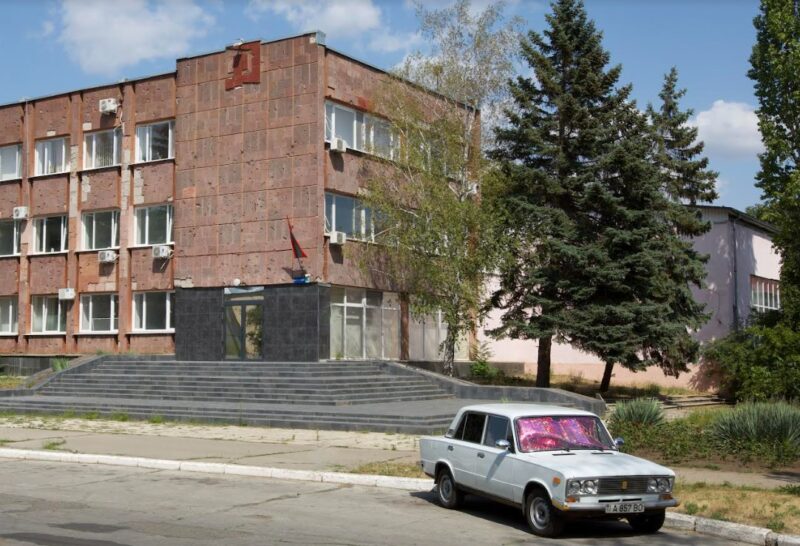
Many administration buildings still bear the holes from shell damage and are a constant reminder of what terror this conflict brought to the region. Photo credit: Dean O’Brien
War in Ukraine
Whilst the war in Donbass has raged for over eight years, this region has remained peaceful and played no role in the current operation launched into Ukraine by Russia back in February earlier this year.
Since Russia launched its operation in Ukraine on February 24, Transnistria has constantly stated that they do not pose a threat to anyone and that they are not an enemy of Ukraine. However, as rumours emerge that Ukrainian forces are on the verge of running out of munitions, it has been suggested that Kiev is seriously considering a raid on Russia’s 14th Army munitions storage, located near the village of Cobasna in the north of Transnistria and about 3km from the Ukrainian border.
Russian have kept this huge munitions depot, the largest in Europe, since the region was part of the Soviet Union. The reason is said to be that there was simply too much ammunition to move. According to various estimates, more than 20 000 tons of ammunition has been stored there since the Soviet era.
Shortly after Russia launched their operation, Ukraine closed all their border crossing points along Transnistria’s 400-kilometre border, creating problems for citizens on both sides. Many here believe that this was an unnecessary act which only targeted civilians whom they believe hold “pro-Russian” sympathies.
Although there is peace here, one cannot ignore the geographical importance of this area due to its close proximity to the strategic Black Sea port of Odessa in Ukraine. However, nobody is certain, what, or if, Russia has any plans for this strip of land.
Recent attacks
On April 25, three masked men pulled up in a car outside the Ministry for State Security in the centre of Tiraspol and fired a number of RPG grenades at the building. Nobody was injured, and to date, no one has been caught. Then the following evening on April 26, there were reports of a drone attack which caused an explosion. Again, nobody was killed nor caught.
That same morning, the antennas of a powerful transmitter were blown up in the village of Maiac. Then on April 27, there was a shooting near the ammunition storage base outside the village of Cobasna.
Authorities in Transnistria claimed that there was a Ukrainian connection to those attacks and declared the highest level of a terrorist threat. Russia expressed concern, and Ukraine blamed Russian intelligence services for provocations.
Transnistrian President, Vadim Krasnoselsky, was adamant that Ukraine were behind the attacks, stating: “We know where the terrorists came from and where they went afterwards. I assure you, they have nothing to do with the Transnistria issue, as reported by Azerbaijan 24 news channel on May 17.”
Since the attacks, checkpoints have been set up all across Transnistria at the entrance and exit of all major towns and cities in order to increase security and prevent future attacks.
Although there is open support here for Russia, to date there has not been any demonstrations on the street in support of the operation launched into Ukraine by Russia. This has helped to maintain the status quo in what is classed as a peaceful region where Ukrainians, Russians and Moldovans live side by side.
Whilst heading north from Tiraspol on the M4 towards Malaesti, Ukraine, Transnistria and Moldova are separated by just one road which runs between the two borders. The road is in the territory of Transnistria, on the left is Moldova and on the right Ukraine.
I stop to take a look at the Ukrainian side of the road which now takes the form of mined trenches. Locals have expressed concern over the fact that there are no warning signs (which are normally red and have the skull and crossbones symbol). This mined area presents a huge danger for children, farmers and livestock. One resident told me that this was “reckless behaviour and typical of Ukrainian forces trying to provoke trouble in this peaceful region”.
International travel for those living here can be an issue, as holding a Transnistrian passport naturally restricts movement. Many people have chosen to obtain a Ukrainian, Russian, Moldovan, Romanian or Bulgarian passport in addition to the Transnistrian one. Many of those I spoke to had a combination of these passports, with some claiming to hold all five.
Banning Soviet Symbols
More recently Moldova has taken the bold decision to ban the screening of Russian and Soviet films about the Great Patriotic War. The St.George’s ribbon along with “Z” and “V” symbols have also been banned in an attempt (like Ukraine) to seek closer ties with the West.
On April 14, Moldova’s President Maia Sandu stated, as quoted by Interfax News Agency: “I have today promulgated a law banning the use of signs symbolising war and aggression. This does not affect our historical memory. On the contrary, we must further honour and respect the memory of those who died in the most dreadful war of the 20th century. At least 100 000 citizens of Moldova perished in that war. For the sake of their memory, we must preserve peace and social harmony.
“Nobody is banned from celebrating May 9. On the contrary, it is our duty to remember the victory of civilization over Fascism and Nazism. We must honour the memory of those who brought peace on earth. Regrettably, war has now returned to Europe. And we all see what signs are being used in Kharkiv or in Mariupol, and in devastated Bucha,” she said.
Anyone violating the ban faces a fine of 4 500 – 9 000 leu ($250-$500) or unpaid community service of 30 – 60 hours for individuals, and a fine of 9 000-18 000 leu ($500 – $1,000) for legal entities and state officials.
Not everybody in Moldova was happy about this new law and on April 15 in the Moldovan city of Balti, a demonstration was organised by socialists and communists. They claimed that the decision to introduce this law was a betrayal of their past and was only created to satisfy the EU.
For many in both Eastern Europe and Russia, the St. George’s ribbon symbolises the Victory over Nazi Germany in the Great Patriotic War (1941-45) in which 27 000 000 Soviet citizens gave their lives. As expected, the reaction from the Russian embassy in Chisinau was stern with them stating that this decision “complicated movement toward peace and friendship”.
Last week Transnistrian President Vadim Krasnoselsky started pushing for the West and Russia to sign a document that would provide security guarantees for the region. He did this whilst attending the “5+2” peace talks, which consisted of Transnistria, Moldova, Russia, Ukraine and the OSCE, with the EU and US as observers. And because Moldova has now applied for EU membership, Krasnoselsky added that ”Moldova and the PMR were moving in opposite directions”.
Russian troop rotation in Transnistria has become another issue to contend with. Russian officers who travel to Transnistria via Chisinau Airport every six months have repeatedly been detained without any explanation, thus aggravating an already tense situation. Moldova continues to deny that it is in any way attempting to sabotage the rotation of these troops, many of whom make up the peace-keeping force there. The bulk of the Russian troops not connected with the peace-keeping force are guards for the munitions depot in Cobasna. Until 2014, the troops used the land crossing from Ukraine, but once the conflict started in Donbass back in 2014, this was no longer an option.
Regardless of various rumours, it’s not realistic to think that the 1 500 Russian troops based in Transnistria could be used to enter Ukraine. Nobody here wants to see a repeat of the war in 1992.
Although there have been numerous appeals for calm, only last week whilst discussing the ongoing issue in Moldova, the head of the Main Directorate of Intelligence of the Ministry of Defence in Ukraine, Kirill Budanov, stated that Ukrainian forces were ready to “get rid of the occupying forces on its territory” (referring to Transnistria and Russian soldiers).
Many people saw this statement as a deliberate provocation to what has up to now been a relatively peaceful region.
At present, there are only occasional attacks from Russian forces on Odessa and the south west of Ukraine, but as the conflict draws ever closer to the region, it’s anybody’s guess what will happen next…
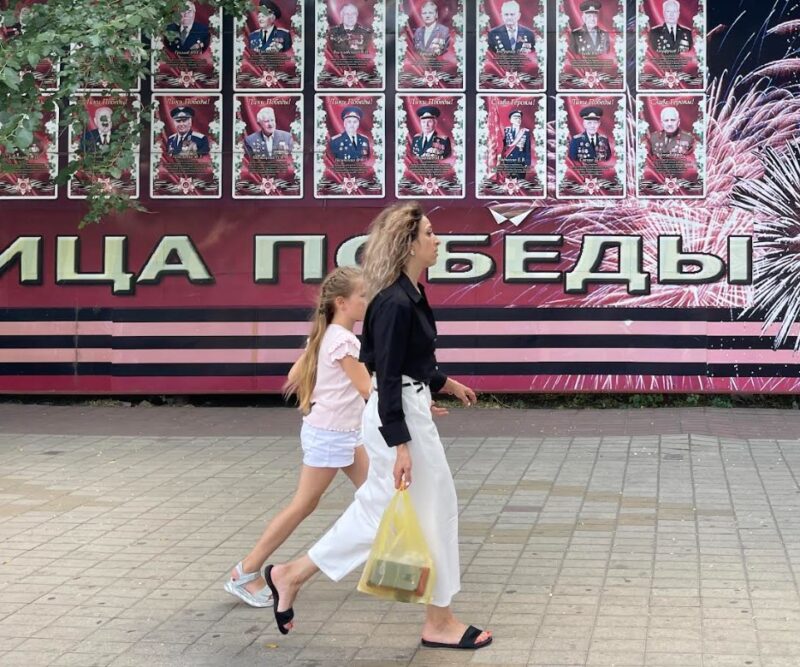
A mother and daughter walk past a Victory Day poster on the main street in the centre of Tiraspol. Photo credit: Dean O’Brien
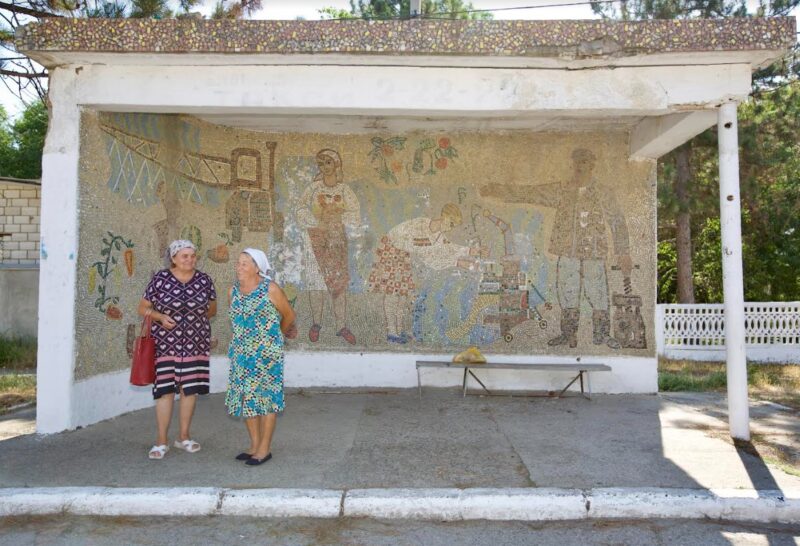
Two Transnistrian residents enjoying the good weather and relative peace in front of a Soviet mosaic mural at a bus stop. Photo credit: Dean O’Brien
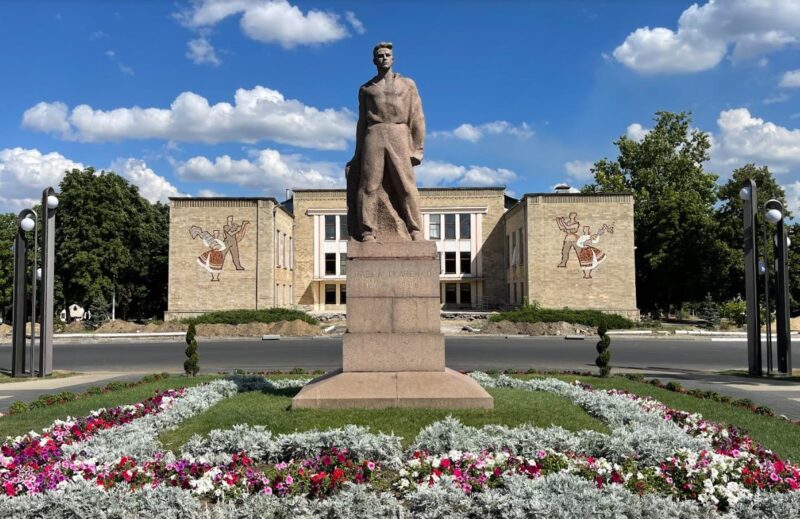
A monument dedicated to activist Pavel Tkachenko stands in front of a building decorated with mosaics in the city of Bender. His name was adopted for Moldavan enterprises, cultural institutions, and streets bore his name in Chișinău, Bender, and Tiraspol. A museum dedicated to Tkachenko is also in Bender. Photo credit: Dean O’Brien
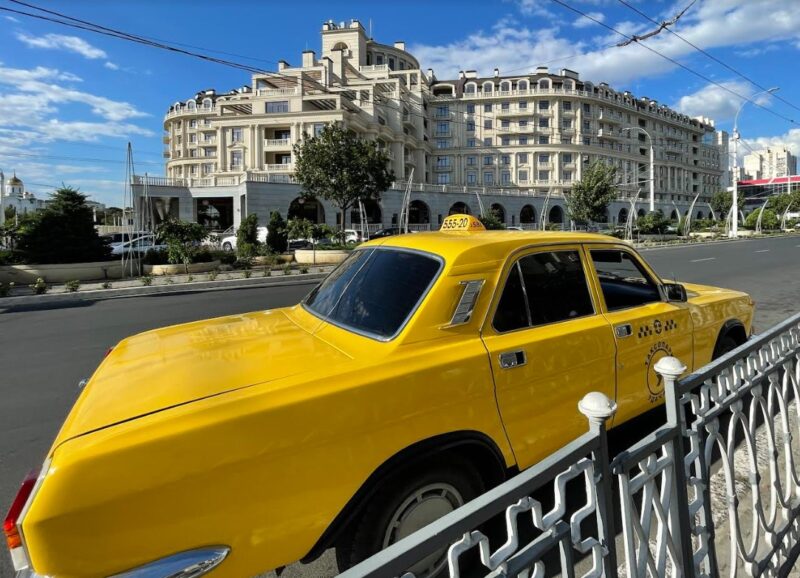
A yellow Soviet Volga taxi parked alongside a newly built modern building in the city centre. Although not officially recognised, there is still investment in the country. Photo credit: Dean O’Brien

Alexander Vasilyevich Suvorov, the famous Russian general in service of the Russian Empire who founded Tiraspol in 1792. Alongside are the three flags of the 3 countries that officially recognise the PMR: Abkhazia, Artzakh and South Ossetia. Photo credit: Dean O’Brien
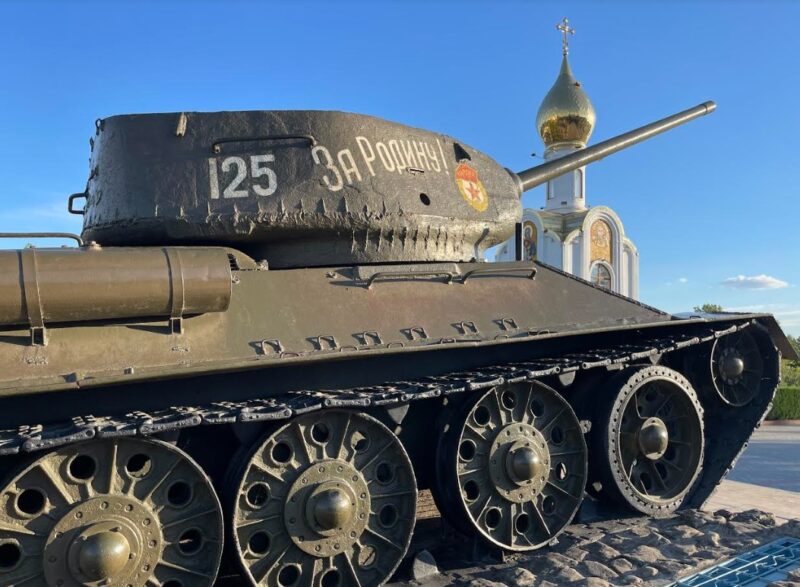
Tank monument. A Soviet tank sits on a plinth with an Orthodox Church in the background in the centre of Tiraspol. Photo credit: Dean O’Brien
All rights reserved. You have permission to quote freely from the articles provided that the source (www.freewestmedia.com) is given. Photos may not be used without our consent.
Consider donating to support our work
Help us to produce more articles like this. FreeWestMedia is depending on donations from our readers to keep going. With your help, we expose the mainstream fake news agenda.
Keep your language polite. Readers from many different countries visit and contribute to Free West Media and we must therefore obey the rules in, for example, Germany. Illegal content will be deleted.
If you have been approved to post comments without preview from FWM, you are responsible for violations of any law. This means that FWM may be forced to cooperate with authorities in a possible crime investigation.
If your comments are subject to preview by FWM, please be patient. We continually review comments but depending on the time of day it can take up to several hours before your comment is reviewed.
We reserve the right to delete comments that are offensive, contain slander or foul language, or are irrelevant to the discussion.

Swedish military wants to remilitarize the Åland Islands
The demilitarized autonomy has previously been known as 'the islands of peace.

NOAA Predicts Zero Sunspots for Almost the Whole 2030s
CLIMATEThe United States' government scientific organization, the National Oceanic and Atmospheric Administration (NOAA), predicts zero sunspots from 2031 to 2040. This is an extreme situation that has not occurred in as long as humanity has been counting sunspots, and it leads us into uncharted territory in terms of our solar system. However, this prediction aligns with the warnings of the world-renowned solar researcher Valentina Zharkova for many years, who indicated in 2019 various signs of this catastrophic phenomenon, including the extreme hailstorms we have seen in Europe and the world this summer. The forecast and various observations this year give cause for very significant concern. In this unique analysis, Free West Media explains why.

European Nationalist Parties Forge Cooperation Ahead of EU Elections
EUROPEAN ELECTIONSOn Saturday, August 26, representatives of six European nationalist parties gathered in Budapest. The meeting was initiated by the Hungarian party Mi Hazánk and took place in the national parliament. Representatives of the parties signed a joint declaration that not only reaffirms the parties' friendship but also their unity on a range of complex political issues. A surprisingly clear and radical manifesto was established. The hope is that this cooperation will lead to success in the EU elections and eventually result in the formation of a group in the European Parliament. For Swedish nationalism, this meeting marks a success as Sweden, for the first time, has a party represented in a leading nationalist cooperation in Europe. Free West Media was present at this historic event.

Turkey Believes Sweden Hasn’t Done Enough
Sweden will have to wait a bit longer for NATO membership, according to Turkey's Justice Minister Jilmaz Tunc. First, Sweden must extradite the "terrorists" Turkey wants and stop the desecration of the Quran.

Swedish Weapon Takes Down Russia’s Best Attack Helicopter
The Russian attack helicopter Ka-52 is considered one of the world's best and has struck fear in Ukraine, where it has hunted down tanks and other armored vehicles, often beyond the range of many light anti-aircraft systems. However, it has met its match in the Swedish air defense missile system RBS 70, which has quickly led to significant losses for the Russian helicopter forces.

Strong Confidence in German AfD
Alternative for Germany (AfD) held a party conference on July 29-30 to select candidates for the upcoming EU election next year. EU Parliament member Maximilian Krah, belonging to the party's more radical, ethnonationalist faction, was appointed as the top candidate. The party's two spokespersons delivered powerful speeches criticizing the EU's failed migration policy and trade sanctions that isolate Europe and Germany from the rest of the world. They argued that it's time for the EU to return a significant portion of its power to national parliaments. However, they have dropped the demand for Germany to exit the EU.

The Establishment Wants to Ban Germany’s Second Largest Party – for the Sake of Democracy
The rising popularity of AfD has raised strong concerns within the establishment. Despite lies and demonization in the media and isolation from the overall political establishment, the party continues to grow. Certain representatives of the party are accused of becoming increasingly "extreme," and in an unusual move, the influential weekly newspaper Der Spiegel demanded that AfD be "banned."

Dutch FvD break through the media blockade
What is happening in the Netherlands? It is often difficult to follow events in other countries, especially when distorted by system media. We give Forum for Democracy (FvD) the opportunity to speak out on the political situation in the Netherlands and the staunch resistance they face in trying to save the country.

The Ursula von der Leyen Affair
After a criminal complaint in Belgium against the President of the European Commission, the so-called SMS-case, now takes a new turn. The judge responsible for the investigation will likely gain access to the secret messages exchanged between Ursula von der Leyen and Albert Bourla, CEO of Pfizer, at least if they haven't been deleted.

Publisher of Unique Literature Worldwide Blocked by International Distributor
Arktos has distinguished itself by publishing groundbreaking philosophers and social critics. Now, the publisher's international distributor has abruptly terminated the cooperation, and more than 400 already printed titles cannot reach their audience. There is strong evidence that the distributor has been under pressure, something that has also happened in Sweden. We have spoken with Arktos founder Daniel Friberg about the ongoing struggle for freedom of speech in a shrinking cultural corridor.
